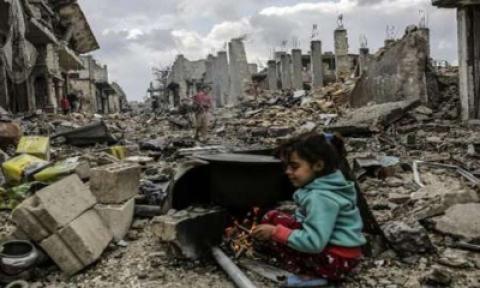The New York Times editorial board recently took an unusual position of denouncing what it called “war crimes” by a U.S. ally, in a war in which the United States is actively participating militarily. “Saudis try to starve Yemen into submission,” was the headline, and it was no exaggeration. As the Times noted, there are nearly seven million people in Yemen, including millions of children, who are facing famine. “At least 10,000 people have been killed, many by Saudi-coalition bombings carried out with military assistance by the United States,” the editorial stated.
The famine and shortages of medicine result from the Saudis deliberately blockading Yemeni ports, including Hodeida, through which 80 percent of Yemen’s food imports arrive. Combined with the destruction of Yemen’s water and sanitation infrastructure, the Saudi war and blockade has also delivered the world’s worst cholera epidemic to Yemen. More than 900,000 people have been sickened, and although cholera is normally easily treatable, thousands have died.
All of this is well known, although neither the atrocities nor the U.S. role in perpetrating them have gotten the attention they deserve. But the efforts of humanitarian and anti-war groups, as well as lawmakers who believe that U.S. military involvement without congressional consent is unconstitutional, are beginning to close in on the perpetrators. Last week, the U.S. House of Representatives passed a resolution, by a margin of 366–30, which did two unprecedented things. First, it acknowledged the U.S. role in the war, including the mid-air refueling of the Saudi-led coalition planes, which is essential to the bombing campaign, and help in selecting targets. Second, it recognized that this military involvement has not been authorized by Congress.
The resolution was a compromise, so it contained a lot of excess verbiage inserted by Republicans, and it was nonbinding. It thus fell short of the goals of its sponsors, led by Reps. Ro Khanna (D-Calif.), Mark Pocan (D-Wis.), Walter Jones (R-N.C.) and Thomas Massie (R-Ky.), who had attempted to use the War Powers Resolution to force a full debate and binding vote to withdraw U.S. military forces from the war. But these two unprecedented statements are a big step toward ending this war.
The process that led to this resolution also forced the military to brief House leaders with classified information on the Pentagon’s role in the Saudi-led war, including its targeting and refueling assistance. It also allowed for a debate on the constitutionality of U.S. military involvement in the war against an indigenous Yemeni rebel group that has nothing to do with Al Qaeda. This is also a very big deal, since Article I of the U.S. Constitution reserves for Congress the right to decide whether our military wages war.
Under the War Powers Act, when the U.S. military is involved in hostilities, any member of Congress can force a debate and full floor vote on this involvement. But the Republicans, with possible complicity from Democratic leadership, threatened to block this vote and most of the debate, thereby forcing the compromise resolution. These details are important, because they show how an engaged citizenry, with just a handful of courageous members of Congress taking the lead, has much more power than is commonly believed to end U.S. involvement in atrocities.
The Republican House leadership did not pass this resolution because they care about people dying in Yemen. They did it because they were afraid of a full debate and vote to direct the president to remove armed forces from engaging in an indefensible war, and the U.S. military’s role in creating and perpetuating the world’s worst humanitarian crisis. They do not want this to become a major political and possibly electoral issue.
The House resolution has now set the stage for the fight to proceed in the Senate, which is more evenly divided. In June, there was an effort led by Sens. Rand Paul (R-Ky.) and Chris Murphy (D-Conn.) to block about $500 million of arms sales to Saudi Arabia. It failed, but the vote was 53-47. Speaking on the floor of the Senate last week, Murphy said, “It is U.S. refueling planes flying in the sky around Yemen that restock the Saudi fighter jets with fuel, allowing them to drop more ordnance. It is U.S. made and transferred ordnance that is carried on these planes and are dropped on civilian and infrastructure targets inside Yemen. The United States is part of this coalition. The bombing campaign that has caused the cholera outbreak could not happen without us.”
It is important for as many people as possible to get involved in this next phase of the fight because this is the world’s best chance of ending this nightmare, as United Nations aid chief Mark Lowcock warned of Yemen experiencing “the largest famine the world has seen for many decades with millions of victims.” If Congress turns against this war and blocks U.S. involvement, the Saudis will have to negotiate an end to the conflict. Americans can contact their senators and representatives in Congress, and ask them to help put an end to this unconstitutional war, the mass starvation and the killing. Sooner or later, this war must come to an end. The only question is how many people, mostly civilians including children, will die before it does.
[Mark Weisbrot is co-director of the Center for Economic and Policy Research in Washington, D.C. and president of Just Foreign Policy. He is the author of the 2015 book “Failed: What the ‘Experts’ Got Wrong About the Global Economy,” published by Oxford University Press. You can subscribe to his columns here.]


Spread the word